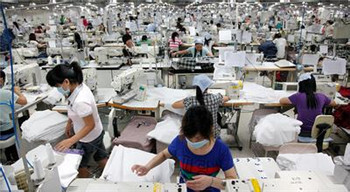
A private reading on China's manufacturing sector suggests the slowdown continued last month but that conditions had not worsened as much as in October. The Caixin-sponsored preliminary manufacturing PMI was 48.6 in November, versus expectations of 48.3. It had been 48.3 in October.
11月,由財新網(Caixin)贊助的中國制造業采購經理人指數(PMI)初值為48.6,高于預期的48.3。而10月份該讀數則為48.3。讀數顯示上個月中國制造業活動在繼續放緩,不過情況沒有10月份那么糟糕。
It was last above 50 - the threshold separating contraction from expansion - in February.
該讀數最后一次高于50是在2月份。對于該指數來說,是否高于50是區分制造業活動是擴張還是收縮的榮枯線。
The Caixin-sponsored series is based on a much smaller sample of private companies than the official PMI reading, which focuses on larger state enterprises, and tends to be more volatile.
這個由財新贊助的系列指數,是基于對民營企業的調查得出的,樣本數目也比官方PMI指數少得多,往往波動性更大。相比之下,官方PMI指數則主要關注規模更大的國有企業。
However the prolonged period of contraction fits with the overall pattern of the slowing Chinese economy.
不過,漫長的收縮期也符合正在放緩的中國經濟的總體趨勢。
Less than an hour ago the official manufacturing PMI for November came in at 49.6, the fourth consecutive month of contraction and below the 49.8 reading economists were looking for. Analysts at ANZ said, in relation to that PMI series:“With soft growth momentum and deflation pressures creeping up, we expect the authorities to further ease monetary policy and continue to implement an expansionary fiscal policy in order to prevent further slowdown of the economy in 2016.”
在不到一小時前,11月中國官方制造業PMI指數公布,為49.6,是連續第四個月收縮,也低于經濟學家49.8的預期。在談到這一PMI指數時,澳新銀行(ANZ)分析師表示:“由于增長勢頭疲軟和通縮壓力加劇,我們預計當局會進一步放寬貨幣政策并繼續實施擴張性財政政策,以阻止經濟在2016年進一步放緩。”











